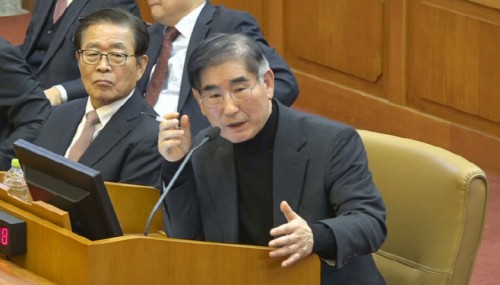 |
| Kim Yong-hyun, former Minister of National Defense, testifies during the fourth impeachment trial session at the Constitutional Court in Jongno District, Seoul, in January. / Source: Constitutional Court |
Kim Yong-hyun, former Minister of National Defense and the first figure indicted by the special counsel probing the rebellion case, will undergo a separate trial, the Seoul Central District Court announced on June 20. His additional charges have been assigned to the 34th Criminal Division, rather than the 25th Criminal Division that has been overseeing related rebellion cases.
The court explained the decision was based on a computerized random allocation system, taking into account the nature of the case, the presence of co-defendants, and other procedural factors. However, legal experts are closely watching whether Kim will face another detention order, as his current remand is set to expire on June 26.
Special Counsel Cho Eun-seok filed new charges against Kim on June 18, including obstruction of official duties and instigating destruction of evidence. These new charges appear to be a strategic move aimed at preventing Kim’s release, since re-detention on the same rebellion charges is not legally permitted once released. To this end, the special counsel also filed for cancellation of Kim’s bail and requested a new arrest warrant. A motion has also been submitted requesting the consolidation of the new charges with the existing rebellion case for a joint trial.
Despite initial speculation that the additional charges would be merged into the ongoing rebellion trial under the 25th Criminal Division, it is now the 34th Criminal Division that will handle Kim's detention review. The court will hold a hearing to determine his detention status on June 23 at 2:30 p.m.
Legal professionals suggest that the nature of the new charges — closely tied to the rebellion case — makes further detention likely. Attorney Kim So-jung noted, “If the special counsel has presented sufficient evidence to support the charges, there is a strong possibility the court will approve continued detention.”
However, Kim’s legal team is strongly contesting the legitimacy of the indictment. They argue that the special counsel is still within the legally defined preparatory period and thus lacks the authority to prosecute at this stage. Critics within the legal community have also raised concerns that the indictment — made just six days after the special counsel’s appointment and before the formal investigation phase began — was rushed.
Attorney Lee Heon of Hongik Law Firm stated, “Whether the special counsel had the right to indict during the preparation period is a key legal issue and could be a point of contention during the trial.” He added that the court may take this into consideration during the detention hearing.
Attorney Kim also pointed out, “It typically takes several months to reach a decision on whether to indict. Filing charges just six days after the appointment suggests the investigation was not sufficiently thorough and may have been prematurely pursued simply to maintain detention — raising concerns of a hasty and careless indictment.”
Special Counsel Cho maintains that the indictment was filed following the official launch of the investigation, after shortening the maximum 20-day preparation period.
Most Read
-
1
-
2
-
3
-
4
-
5
-
6
-
7





















